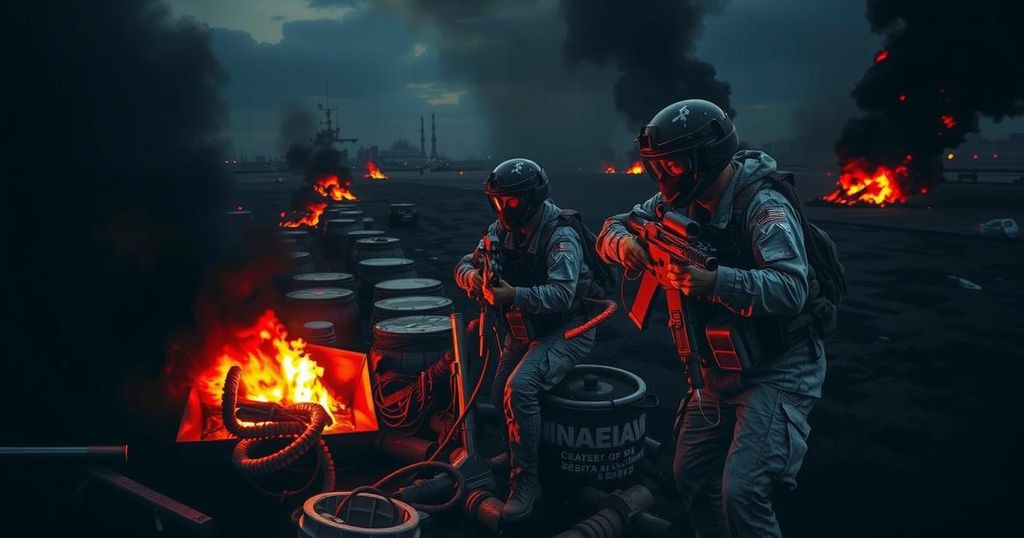Global news
AD, ADEL ABDEL GHAFAR, AIRSTRIKES, AL, AL - MAWASI, AL JAZEERA, ANTONY BLINKEN, ASIA, BEIRUT, BELGIUM, BLINKEN, BRUSSELS, CONFLICT, DEVELOPMENT AID, DOCTORS WITHOUT BORDERS, EUROPE, FOREIGN POLICY AND SECURITY, GAZA, GAZA STRIP, GHAFAR, HAMAS, HEZBOLLAH, ISRAEL, ISRAELI-PALESTINIAN CONFLICT, LEBANON, MAWASI, MIDDLE EAST COUNCIL ON GLOBAL AFFAIRS, MILITARY OPERATIONS, MSF, MY, MYRIAM, NORTH AMERICA, UN, UNITED STATES, US
Isaac Bennett
0 Comments
Escalation of Violence: Israel’s Military Actions in Gaza and Lebanon
Israeli forces have intensified military operations in Gaza and Lebanon, resulting in significant civilian casualties, with 33 killed in Gaza and 78 in Lebanon. Despite international calls for an end to hostilities, skepticism remains about their impact on the ground as humanitarian crises worsen, highlighted by Doctors Without Borders following an Israeli airstrike damaging their medical facilities.
Israeli military operations continue to intensify in Gaza and Lebanon, resulting in significant casualties. Reports indicate that Israeli forces have killed 33 individuals in Gaza and 78 in Lebanon. A United Nations expert has raised concerns over Israel’s alleged strategy of using starvation as a means to drive out residents from northern Gaza. In diplomatic circles, U.S. Secretary of State Antony Blinken has urged Israel to conclude its assaults, asserting that it has achieved its military goals of dismantling Hamas’s infrastructure in the region. Blinken stated, “This should be a time to end the war.” Expert Adel Abdel Ghafar has expressed skepticism concerning the efficacy of Blinken’s remarks in influencing the situation on the ground. International organizations are also highlighting the adverse impacts of the conflict; Doctors Without Borders (MSF) reported that an Israeli airstrike targeted the al-Mawasi area, destroying their medical clinic despite it being designated a safe zone. An MSF coordinator lamented, “Both staff and patients fled the clinic.” MSF strongly criticized these hostilities, calling them evidence of a blatant disregard for humanitarian principles and Palestinian welfare. There is ongoing global scrutiny and condemnation of the escalating violence, emphasizing the urgent need for a diplomatic resolution to the conflict that has led to extensive humanitarian crises.
The conflict between Israel and Palestinian groups, particularly Hamas, has a deeply rooted history characterized by cycles of violence and retaliatory strikes. The recent escalation has resulted in tragic loss of life, drawing international attention and condemnation. The humanitarian impact is severe, with credible allegations pointing to the use of starvation as a tactic in military strategy. As parties involved seek military objectives, global leaders and humanitarian organizations are increasingly calling for the recognition of humanitarian laws and protection of civilian lives. This ongoing crisis has sparked debates about the roles of external actors and the need for intervention to restore peace.
In summary, the escalating violence between Israel and Hamas has resulted in tragic civilian casualties in Gaza and Lebanon, drawing criticism from international observers and organizations. Diplomatic efforts, such as calls from U.S. Secretary of State Antony Blinken to cease hostilities, highlight the need for a resolution, yet skepticism remains regarding their effectiveness. The humanitarian implications of this conflict necessitate urgent attention to protect civilian lives and adhere to international law, emphasizing the pressing need for a peaceful settlement.
Original Source: www.aljazeera.com




Post Comment